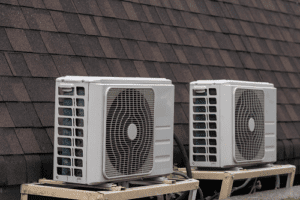With all of the available information out there regarding HVAC systems and how they work, it can be overwhelming to have to narrow the options down and determine the home HVAC unit that’s right for you. Experienced salespeople and technicians may speak about BTU, EER, SEER, building load, and other terms that require a more thorough examination. For most people, however, it’s more helpful to have a good working understanding of what sets different kinds of systems apart from each other.
Your Choices for a Home HVAC Unit
 To begin, we’ll address the different options you have for your home HVAC unit. While you’ll generally install both your heating and cooling systems simultaneously, they are often distinct systems sharing ductwork. Consider the following kinds of systems and how they control your home’s temperature:
To begin, we’ll address the different options you have for your home HVAC unit. While you’ll generally install both your heating and cooling systems simultaneously, they are often distinct systems sharing ductwork. Consider the following kinds of systems and how they control your home’s temperature:
- Central Air Conditioning – Most homes with air conditioning use a central air conditioning unit. This system uses an exterior component to expel heat from the house and cool a chemical refrigerant that cycles back into the house, capturing more heat from the inside, and expelling it once more outside. The condenser cools a medium so that there’s no actual exchange between the air outside and inside. Instead, the different airflows remain distinct, and your air conditioner cools and recycles the air already in your home. This kind of system demands that you home has ductwork throughout, as the cooled air must be cycled throughout the house and returned to the interior unit.
- Natural Gas or Oil Furnace – You can consider a central furnace to be the heating equivalent of the central air conditioning unit. Like central AC, the furnace relies on ductwork to cycle cool air from throughout your house, then heat it in the furnace before sending it back through the ventilation system to your house. This process heats your home without building up pressure, as it continuously cycles the same amount of air throughout your home. These systems can range in efficiency between standard 80% to high-efficiency 98% models.
- Radiators – It’s worth mentioning an older style of heat that still works. Rather than directly heating air in the furnace and pumping it throughout your home, radiators rely on the furnace heating water that gets pumped through a series of pipes. These pipes feed into radiators in your various rooms, which then gradually exude heat into the surrounding area. These systems are much slower than air-based systems, but they can be just as effective. Be aware that radiators can get quite hot, so many people use special covers to prevent accidents.
- Heat Pump – In some ways, heat pumps use the same technology behind air conditioning in reverse. Unlike air conditioning, they can take advantage of internal temperature differentials to heat your home even more efficiently than an air conditioner can cool it. This efficient operation is mainly present in climates such as the southwest coast where winters are comparatively mild. Unless you live in a region that sees the temperature drop dramatically, you may be able to use a heat pump to keep your home warm through the winter without needing to resort to burning fuel in a central furnace. However, you’ll still need to use ductwork to get the heated air throughout your home.
- Zoned Systems – While most of the above systems generally use a single thermostat, you can separate your home into different zones. This added function lets you more efficiently heat or cool only those rooms that require climate control, though it demands a more complicated system. Your ventilation must be adjusted to close off some rooms, you’ll usually need to install additional fans to keep the airflow going, and you must ensure to connect the thermostats to the furnace.
Within each of those categories, there are variations such as geothermal heat and radiators beneath the floorboards or within the walls. However, the majority of home HVAC systems on the market fit within these groups.
Selecting the Ideal Unit for Your Needs
When discussing the heat pump, we alluded to the fact that the local climate plays a significant role in which units are best suited for your home. Some people may be located next to lakes or rivers that enable some systems to take advantage of the below-ground temperature for more efficient heating and cooling without using combustible materials. Alternatively, you can use solar power to generate the electricity needed for your heating and cooling systems if the local conditions allow for it. We recommend that you bring an experienced HVAC contractor to your home so that they may assess which systems are appropriate for your home.
Consider Maintenance for Your Home HVAC Unit
Another point to consider when choosing a home HVAC unit is that these units require different maintenance. The most complicated systems will require a service call for any issue, but as long as you remain alert to any performance changes, you should avoid minor problems worsening. Most preventive maintenance can be conducted by scheduling a duct cleaning every year or two and requesting that a technician examine your system semiannually.

